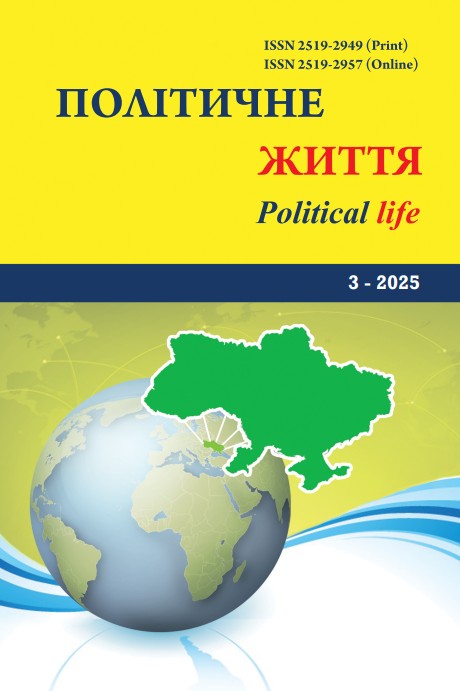Political culture of russian society as a culture of permanent war
DOI:
https://doi.org/10.31558/2519-2949.2025.3.10Keywords:
political culture, political consciousness, Russian-Ukrainian war, cult, cult of the leader, cult of war, traditional valuesAbstract
The political culture of russian society at the present stage is extremely ritualized. The sacralization of power, which has always taken place in previous periods of russian history, is currently supplemented by new rituals, which quite clearly trace a set of certain cults. One can even make an assumption that the political culture of russian society is actually a system of a number of cults that are interconnected and complement each other. The main cults include the cult of history (which takes place in the ritual experience of «heroic» past), the cult of power (which proclaims respect for power as a fundamental principle in the politics of russian society), the cult of the leader (an archaic cult that is combined with the technological capabilities of modern propaganda) and the cult of traditional values (a set of conservative values mixed with Orthodoxy and the culture of patriarchy). This set of cults together creates the fundamental basis for two more cults, namely the cult of war (of permanent confrontation with the West as a «hostile» culture whose values are supplanting «traditional» ones), and the cult of death (which aims to depersonalize a person and devalue his or her life, subordinating it to the service of «higher» meanings, in particular the idea of greatness). The entire system of cults works to form and maintain imperial consciousness, which ensures the survival of the ruling elite. Thus, the state of permanent war is the norm that ensures the qualitative characteristics of the political culture of russian society. Ukrainian Political Science should not avoid studying the political consciousness and culture of russian society, since research of this kind has made it possible to thoroughly study an aggressive neighbour who sees his antipode and enemy in Ukrainian society with its developed culture of civic participation. The main goal of such research is to strengthen Ukraine’s defence capabilities.
References
Аккерман Г. Безсмертний полк. Священна війна Путіна / перекл. з франц. П. Таращук. Тернопіль: Навчальна книга Богдан, 2019. 216 с.
Арендт Х. Джерела тоталітаризму / Пер. з англ. Київ: Дух і Літера, 2005. 584 с.
Вандич П. Ціна свободи. Історія Центрально-Східної Европи від Середньовіччя до сьогодення / Пер. з англ. С. Грачова. Київ: Критика, 2004. 463 с.
Винницький М. Український Майдан, російська війна. Хроніка та аналіз Революції Гідності / Перекл. з англ. Р. Клочка. Львів: Видавництво Старого Лева, 2021. 560 с.
Гоббс Т. Левіафан / Пер. з англ. Київ: Дух і Літера, 2000. 606 с.
Горбулін В., Бадрак В. Російська війна проти України. Як нарешті розірвати чотирьохсотрічне замкнене коло. Київ: Брайт Букс, 2024. 302 с.
Гордійчук О. Вплив війни з РФ на політичну ментальність та політичну культуру українців. Вісник Маріупольського державного університету. Серія: Історія. Політологія. 2024. №40. С. 93-105.
Зеленько Г., Кононенко Н. Як російська військова агресія змінила політичну ідентичність українців. Національна безпека і оборона. 2022. № 3–4. С. 108–114.
Осіпова З. Трансформація політичної культури громадян України в умовах гібридної агресії росії. Вісник Маріупольського державного університету. Серія: Історія. Політологія. 2024, Вип. 39. С. 120-132.
Поппер К. Злиденність історицизму / Пер. з англ. Київ: «АБРИС», 1994. 192 с.
Херпен М.Х. Ван. Війни Путіна. Чечня, Грузія, Україна: незасвоєні уроки минулого. Харків: Віват, 2015. 304 с.
Шерех Ю. Пороги і запоріжжя: Література. Мистецтво. Ідеології: в 3 т. Харків: Фоліо, 2012. Т.1. 571 с.

